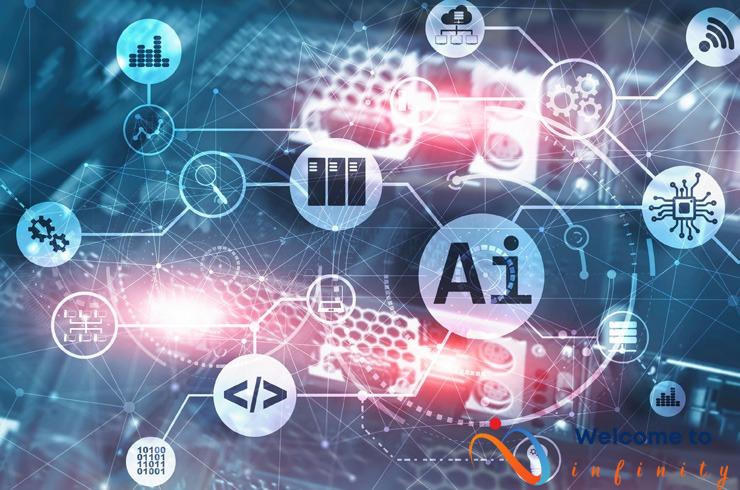As technology advances, the legal sector is evolving, and AI is at the forefront of this transformation. AI has become an essential tool in the legal industry and has the potential to revolutionize the way legal services are being delivered. The use of AI in creating intelligent legal systems that increase efficiency and enhance legal decision-making is gaining popularity.
One of the major applications of AI in the legal industry is automating legal processes. AI is used to automate repetitive tasks such as contract review, document analysis, and legal research, saving time and improving accuracy. These tasks are time-consuming and require high levels of accuracy, which can lead to human error. AI-powered systems are trained to detect patterns and trends in large volumes of data, allowing them to automate these processes, freeing up legal personnel to focus on other tasks.
Predictive analytics is another critical application of AI in the legal industry. AI predictive analytics is used in evaluating legal cases to forecast the outcome and provide legal insights. This technology uses machine learning algorithms to analyze data from previous cases and legal documents to predict the outcome of a current case. Predictive analytics for litigation risk assessment and legal research is used to enhance the accuracy and efficiency of legal research and provide legal insights based on data analysis.
The use of AI-powered legal decision-making tools is another critical application of AI in the legal industry. These tools are revolutionizing the legal industry by providing legal practitioners with advanced analytical tools for decision-making. AI-powered legal decision-making tools analyze vast amounts of data and provide insights that traditional methods of legal research cannot. The use of these tools can lead to faster and more accurate legal decisions, increasing the efficiency and effectiveness of legal services.
Despite the benefits of AI in the legal industry, there are challenges and limits to its adoption. Ethical and regulatory compliance and data privacy concerns are among the challenges faced in the adoption of AI-powered legal systems. Therefore, despite the benefits of AI, the legal industry must remain vigilant in ensuring that it is used ethically and within the bounds of the law.
Automating Legal Processes using AI
Artificial Intelligence (AI) is revolutionizing the legal industry by automating repetitive tasks such as contract review, document analysis, and legal research. The use of AI-powered tools enables legal practitioners to save time, increase efficiency and accuracy in legal processes.
AI is used in contract review to extract relevant information such as names, dates, and terms of the contract, while flagging potential issues. This helps legal practitioners to quickly and accurately review contracts, reducing the time taken to complete this task. Additionally, AI-powered document analysis software can analyze large volumes of legal documents, automatically categorize them, and identify similarities and differences in content. This ensures that legal practitioners are able to quickly access relevant documents, saving time and improving accuracy.
AI is also used in legal research to streamline the process of analyzing and synthesizing case law. By automating legal research, AI-powered algorithms can quickly sift through massive amounts of data to identify useful information and trends in legal cases. This enables legal practitioners to make better-informed decisions, saving time and improving accuracy in legal research.
The use of AI in legal processes is becoming increasingly popular due to the many benefits it offers. By automating repetitive tasks such as contract review, document analysis, and legal research, legal practitioners are able to focus on more complex and strategic tasks, leading to increased efficiency and productivity.
Predictive Analytics in Law
Predictive analytics, a form of artificial intelligence, is revolutionizing the legal industry. The use of AI predictive analytics enables legal practitioners to evaluate legal cases and predict the potential outcome with a high degree of accuracy. Legal analytics software can analyze vast amounts of legal data from various sources, including case law, legislation, and court transcripts, to identify patterns and trends. This technology offers significant benefits to legal professionals by providing legal insights that can help win cases, reduce risk, and make better decisions.
AI predictive analytics can assist in various legal tasks, including risk assessment, contract analysis, and legal research. For example, predictive analytics can help assess the likelihood of a case proceeding to trial or estimate damages in a tort case. Additionally, legal professionals can use predictive analytics to gain insights into legal documents such as briefs, pleadings, and contracts. This technology can detect potential issues, recommend actionable steps, and identify alternative arguments that may impact legal outcomes.
Legal practitioners can leverage predictive analytics to save time and improve the accuracy of their work. This technology can quickly analyze and assess legal cases and data, allowing legal professionals to make informed decisions efficiently. Predictive analytics can also help identify the ideal jurors for a case, which can significantly impact the final outcome. As a result, predictive analytics has become an essential tool for many legal professionals, enabling them to provide better legal counsel and deliver superior results for their clients.
Although AI predictive analytics has significant potential in the legal industry, there are limitations to its adoption. Some of the challenges facing legal professionals include ethical and regulatory compliance, data privacy concerns, and the need for comprehensive training. Additionally, some legal professionals may have concerns about the reliability and accuracy of AI predictions. Despite these challenges, the use of AI predictive analytics is expected to continue to grow and revolutionize the legal industry.
Predictive Analytics for Litigation Risk Assessment
Predictive analytics, powered by AI, are revolutionizing various aspects of the legal industry, including litigation risk assessment. With the help of big data and machine learning algorithms, AI systems can thoroughly analyze historical data and predict the probability of litigation outcomes accurately. This technology can also help legal practitioners identify hidden trends and patterns in the data, which in turn, can be used to assess the potential risks involved in a particular legal case.
AI-powered systems can assist legal practitioners by providing them with valuable insights into litigation risks. Predictive analytics can help them to make more informed decisions and develop strategies that are based on comprehensive data analysis. This technology enables legal experts to identify patterns in data, detect early warning signs, and prevent potential issues before they become significant legal problems. In short, predictive analytics can provide legal practitioners with a powerful tool that can help them to take proactive action that minimizes litigation risks.
Legal practitioners can also use AI-powered predictive analytics to identify potential opportunities to settle a case. With accurate predictions, they can negotiate better settlement deals or even encourage the opposing party to settle. Additionally, AI-powered predictive analytics can help investors and businesses assess the litigation risks involved in various legal matters, enabling them to make informed decisions that protect their interests.
Despite the many benefits that AI-powered predictive analytics offer to the legal industry, there remain challenges in the adoption of this technology. One primary concern is the accuracy of the data used for analysis and the inherent limitations of the technology. Another challenge is ensuring ethical and regulatory compliance, including data privacy concerns. The legal industry is a highly regulated industry, and it's vital to safeguard confidentiality and privacy while using AI-powered predictive analytics.
In conclusion, AI-powered predictive analytics offer tremendous potential for the legal industry, especially in litigation risk assessments. This technology can help legal practitioners save time, improve accuracy, and develop better legal strategies. However, like all new technologies, AI-powered predictive analytics come with some inherent challenges that the industry must address.
Predictive Analytics for Legal Research
Legal research is a crucial element of the legal industry. However, traditional legal research methods can be time-consuming and inefficient. The use of AI-powered predictive analytics is revolutionizing legal research by automating the analysis of large volumes of data and providing valuable legal insights.
AI-powered legal research tools can quickly identify and analyze legal data, including case law, statutes, and regulations, and provide legal practitioners with relevant insights. With the help of AI, legal researchers can accurately forecast legal trends and gain a competitive edge.
The use of AI in legal research can also enhance the accuracy and efficiency of legal research. Legal researchers can now access vast amounts of legal data and use advanced algorithms to analyze and evaluate that data. This improves the quality of legal research and reduces the risk of missing out on important legal information.
AI-powered legal research tools can provide legal practitioners with valuable legal insights based on data analysis. For example, predictive analytics can be used to analyze legal data from previous cases to forecast the outcome of a new case. Legal practitioners can use this information to make informed decisions and provide their clients with the best possible legal advice.
- AI-powered legal research tools can quickly analyze large volumes of legal data
- AI can help legal researchers accurately forecast legal trends
- The use of AI in legal research enhances the accuracy and efficiency of legal research
- Predictive analytics can be used to analyze legal data and forecast the outcome of new cases
Overall, the use of AI-powered predictive analytics in legal research has the potential to transform the legal industry by enhancing the accuracy and efficiency of legal research and enabling legal practitioners to make data-driven decisions. As AI technology advances, we can expect to see more widespread adoption of AI-powered legal research tools in the years to come.
The Role of AI in Legal Decision-making
Artificial intelligence (AI) is transforming the way legal practitioners make decisions. AI-powered decision-making tools are providing legal practitioners with more advanced analytical tools that enable them to make accurate decisions with ease. The role of AI in decision-making is increasingly becoming apparent in the legal industry, given the need for high accuracy and efficiency in making legal decisions.
AI-powered decision-making tools are revolutionizing the legal industry by allowing legal practitioners to handle complex cases more efficiently. These tools are designed to analyze data and provide precise legal insights, which can be used to make informed decisions. Legal AI systems are capable of processing vast amounts of data and generating accurate reports, which would have been difficult to generate manually.
One of the most significant advantages of AI-powered decision-making tools is that they help to eliminate human error. By automating decision-making processes, legal practitioners can focus on analyzing insights and making informed decisions without worrying about errors. This ensures that the decisions made are accurate and reliable, which is crucial in the legal industry.
AI-powered decision-making tools are also making it easier for legal practitioners to access legal data faster and more efficiently. By using these tools, practitioners can quickly search thousands of legal documents in a matter of seconds and identify information relevant to their case. This fast and efficient access to data is vital in the legal industry, where time is often a critical factor in decision-making.
In conclusion, AI-powered decision-making tools are playing an increasingly important role in the legal industry. They are revolutionizing how legal practitioners make decisions, providing more advanced analytical tools to enable practitioners to make better and more informed decisions. While there are challenges and limits to the adoption of AI in the legal industry, these systems continue to gain acceptance due to their benefits in enhancing efficiency, accuracy, and speed in decision-making.
Challenges and Limits of AI Adoption in the Legal Industry
As AI technology continues to transform the legal industry, it's important to keep in mind that there are challenges and limits to its adoption. One of the biggest challenges is ethical and regulatory compliance. As the use of AI in legal decision-making and predictive analytics increases, there is a need to ensure that ethical standards are met and that the technology is used in compliance with regulations and laws.
Data privacy concerns are also a major challenge. Legal firms use large amounts of sensitive data which is at risk of being compromised if proper data privacy measures are not put in place. Legal practitioners must ensure that sensitive data is protected and secured, and that proper measures are taken to prevent data breaches and cyber attacks.
Another challenge is the need for skilled professionals who can work with AI-powered legal systems. The legal industry must ensure that lawyers and other legal professionals are trained in the use of AI technology and have the necessary skills to work with these systems effectively. Additionally, not all legal processes can be automated through AI, so there is a need for professionals who can understand what tasks are best suited for automation and which tasks require human expertise.
It's important to keep in mind that AI technology is not a panacea for all legal industry problems. While it can increase efficiency and accuracy in legal decision-making, it's important to recognize that there are limits to its use. The legal industry must strike a balance between adopting new technology and maintaining the human element of legal practice.











